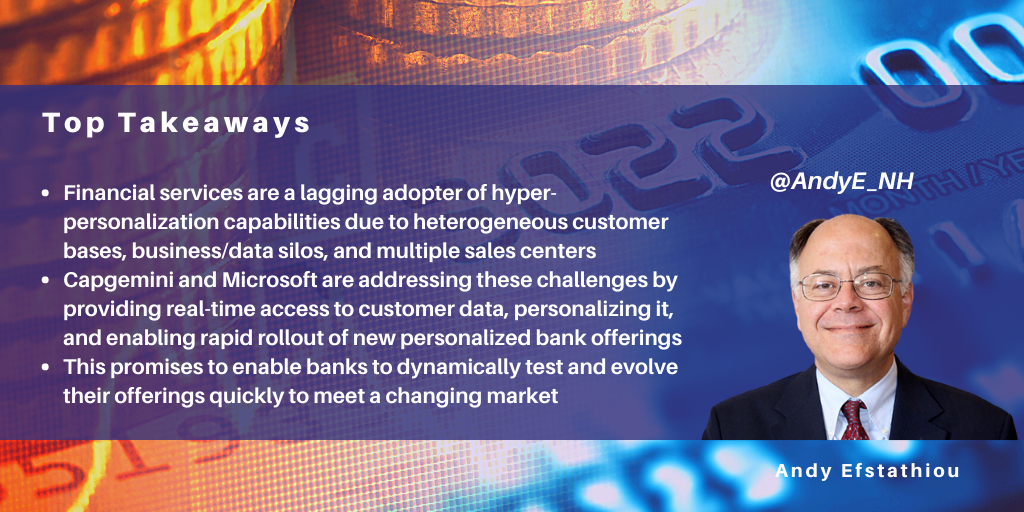Search posts by keywords:
Filter posts by author:
Related NEAT Reports
Other blog posts
posted on Jun 27, 2023 by Andy Efstathiou

Capgemini has partnered with Microsoft to develop and market a dynamic hyper-personalization offering for the financial services industry. This blog explores how hyper-personalization capabilities can be adapted to the unique needs of the financial services industry.
Background
Enterprises want to increase the personalization of their offerings to customers to increase CSAT and sales success. However, effective personalization is an immature art. Enterprises have been using machine learning (ML) to drive the personalization of sales and marketing offerings to their customers. Still, the challenge of ML here is that the user can only generate incomplete information due to the iterative nature of the trials and limited contextual data. The ML bot can only observe the response to a chosen action but doesn't know the answer for other possible actions (i.e., it cannot analyze hypotheses, it can only analyze historical activities).
One method of increasing the effectiveness of personalization initiatives is using contextual-based ML techniques to improve recommendations. ‘Contextual bandits’ is a technique that reinforces the learning algorithm by using contextual information about the environment to make real-time decisions and using rewards at each step. Microsoft has embedded this technique in its Azure Personalizer solution, which enables enterprises to improve their personalization efforts to achieve better CSAT and sales closure.
The Challenge
Financial services is a lagging adopter of hyper-personalization capabilities. Early adopters are consumer industries, including CPG, consumer electronics, and media. Financial services lag in adoption due to the following:
- Heterogeneous customer bases: at the retail level, banks mix consumers and SMBs into a single practical customer base, which often has the same decision-maker, but differing needs and behaviors
- Multiple sales centers: M&A has led to multiple silos selling and competing with each other with the same products for the same customers. Banks continue to be organized by product lines, which also compete for the same clients from product silos.
These characteristics of the banking environment have made traditional AI and ML techniques a poor predictor of consumer behavior. If banks can apply additional parameters and data to understand consumer behavior better, they can develop improved personalized offers. The challenge in achieving this level of analysis is that the banks need to:
- Integrate data across channels, silos, and sources
- Access data across heterogeneous systems and environments
- Better understanding of customer needs
- Deliver personalized, integrated offers across channels.
Capgemini’s Approach
Capgemini and Microsoft have developed an offering to address these challenges. The contributions from the two companies are:
- Capgemini - IT and business services:
- Financial services solutions and accelerators aligned with Microsoft offerings
- IT services for Azure deployments and Microsoft Cloud for Financial Services
- Access to industry specialist ecosystem
- Microsoft - three software products:
- Azure Personalizer, which provides modeling tools and algorithms to contextualize a user’s content reactions
- Semantic Knowledge Graph, which extracts relationships from data and derives features for use in AI models
- Azure Synapse, a cloud-based analytics tool.
Financial institutions have had difficulty effectively implementing the infrastructure to drive hyper-personalization initiatives. Capgemini works with Microsoft and clients to drive this forward across multiple silos and LOBs. Critical to Capgemini’s activities is the ability to build systems that:
- Use real-time data
- Render the data analysis useable (using the Knowledge Graph)
- Personalize the data
- Develop a real-time trial offer
- Roll out successful offers
- Learn from mistakes in real-time.
Critically, the offering should be able to offer customers the best existing product and suggest new products for development. Suggesting product development is especially important for industry transitions, including the deployment of new regulations and changes in customer buying trends (for example, due to demographic differences). The offering also works with SMB customers, not just consumers.
This offering fills a need for financial institutions to help create personalized offerings for customers, especially from new demographic groups. Financial institutions use AI to analyze past data within silos to develop customized offerings but have not yet been able to create forward-looking offerings in response to changing conditions. This offering promises to enable banks to dynamically test and evolve their offerings quickly to meet a changing market.
